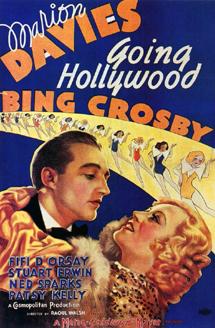
Harry Lillis "Bing" Crosby Jr. was an American singer and actor. The first multimedia star, he was one of the most popular and influential musical artists of the 20th century worldwide. Crosby was a leader in record sales, network radio ratings, and motion picture grosses from 1926 to 1977. He was one of the first global cultural icons. Crosby made over 70 feature films and recorded more than 1,600 songs.

Going My Way is a 1944 American musical comedy drama film directed by Leo McCarey and starring Bing Crosby and Barry Fitzgerald. Written by Frank Butler and Frank Cavett, based on a story by McCarey, the film is about a new young priest taking over a parish from an established old veteran. Crosby sings five songs with other songs performed onscreen by Metropolitan Opera's star mezzo-soprano Risë Stevens and the Robert Mitchell Boys Choir. Going My Way was the highest-grossing picture of 1944, and was nominated for ten Academy Awards, winning seven, including Best Picture. Its success helped to make movie exhibitors choose Crosby as the biggest box-office draw of the year, a record he would hold for the remainder of the 1940s. After World War II, Crosby and McCarey presented a copy of the film to Pope Pius XII at the Vatican. Going My Way was followed the next year by a sequel, The Bells of St. Mary's.
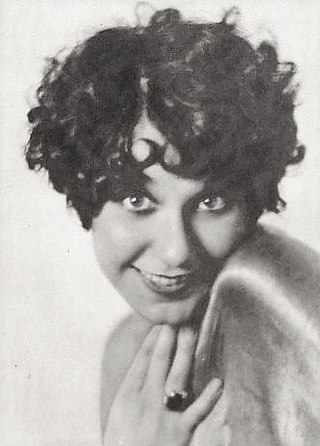
Fifi D'Orsay was a Canadian-American actress and singer.
"There's No Business Like Show Business" is an Irving Berlin song, written for the 1946 musical Annie Get Your Gun and orchestrated by Ted Royal. The song, a slightly tongue-in-cheek salute to the glamour and excitement of a life in show business, is sung in the musical by members of Buffalo Bill's Wild West Show in an attempt to persuade Annie Oakley to join the production. It is reprised three times in the musical.

"Carolina in the Morning" is a popular song with words by Gus Kahn and music by Walter Donaldson, first published in 1922 by Jerome H. Remick & Co.
"Love Makes the World Go 'Round" is a popular song written by Bob Merrill for the 1961 Broadway musical Carnival!. The song is also known as "Theme From Carnival".
"Prisoner of Love" is a 1931 popular song, with music by Russ Columbo and Clarence Gaskill and lyrics by Leo Robin.
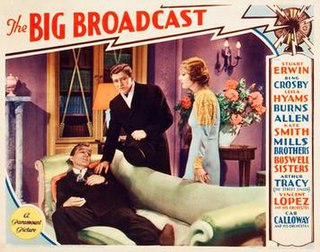
The Big Broadcast is a 1932 American pre-Code musical comedy film directed by Frank Tuttle and starring Bing Crosby, Stuart Erwin, and Leila Hyams. Based on the play Wild Waves by William Ford Manley, the film is about a radio-singer who becomes a popular hit with audiences, but takes a disrespectful approach to his career. His repeated latenesses leads to the bankruptcy of the radio station, but his career is saved by a new friend who buys the station and gives him his job back.

Here Comes the Groom is a 1951 American musical romantic comedy film produced and directed by Frank Capra and starring Bing Crosby and Jane Wyman. Based on a story by Robert Riskin and Liam O'Brien, the film is about a foreign correspondent who has five days to win back his former fiancée, or he'll lose the orphans he adopted. Filmed from late November 1950 to January 29, 1951, the film was released in the United States by Paramount Pictures on September 20, 1951.

Variety Girl is a 1947 American musical comedy film directed by George Marshall and starring Mary Hatcher, Olga San Juan, DeForest Kelley, Frank Ferguson, Glenn Tryon, Nella Walker, Torben Meyer, Jack Norton, and William Demarest. It was produced by Paramount Pictures. Numerous Paramount contract players and directors make cameos or perform songs, with particularly large amounts of screen time featuring Bing Crosby and Bob Hope. Among many others, the studio contract players include Gary Cooper, Alan Ladd, Paulette Goddard, Ray Milland, William Holden, Burt Lancaster, Robert Preston, Veronica Lake, William Bendix, Barbara Stanwyck and Paula Raymond.
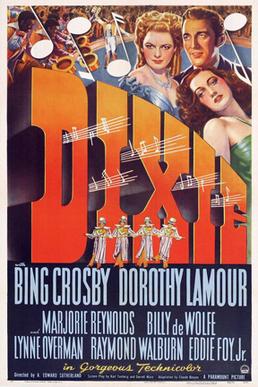
Dixie is a 1943 American biographical film of composer and songwriter Daniel Decatur Emmett directed by A. Edward Sutherland and starring Bing Crosby and Dorothy Lamour. Filmed in Technicolor, Dixie was a box-office hit, and introduced one of Crosby's most popular songs, "Sunday, Monday, or Always". Critical reception to the film was mixed, however.
Riding High is a 1950 American black-and-white musical racetrack film featuring Bing Crosby and directed by Frank Capra. The songs were performed live during filming instead of the customary lip-synching to studio recordings. The film is a remake of an earlier Capra film with screenwriter Robert Riskin titled Broadway Bill (1934). While the film is generally a light musical comedy, its plot contains an unexpected tragic turn.
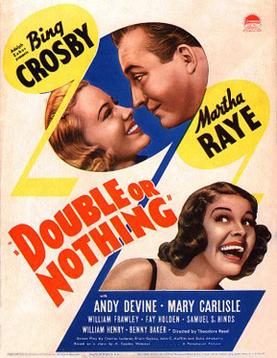
Double or Nothing is a 1937 American musical comedy film directed by Theodore Reed and starring Bing Crosby, Martha Raye, Andy Devine, Mary Carlisle and William Frawley. Based on a story by M. Coates Webster, the film is about a dying millionaire who instructs his lawyer to drop twenty-five purses on the streets of New York City, which are found and returned by four honest people. According to the will, each of them is given five thousand dollars, which they must double within thirty days in order to claim one million dollars. Greedy relatives, who were cut from the will, try to thwart each one's plans. The film features the popular song "The Moon Got in My Eyes".
"(You'd Be So) Easy to Love" is a popular song written by Cole Porter for William Gaxton to sing in the 1934 Broadway show Anything Goes. However Gaxton was unhappy about its wide vocal range and it was cut from the musical. Porter re-wrote it for the 1936 film Born to Dance, where it was introduced by Eleanor Powell, James Stewart, and Frances Langford under its alternate title, "Easy to Love". The song was later added to the 1987 and 2011 revivals of Anything Goes under the complete title "You’d Be So Easy to Love".

This is a filmography for the American singer and actor Bing Crosby.
"Just You, Just Me" is a song from the 1929 musical film Marianne, composed by Jesse Greer with lyrics by Raymond Klages. It was introduced by Marion Davies and Lawrence Gray. The song has had many revisions after its first appearance and has become a jazz standard, having been recorded instrumentally by Red Norvo, Stan Tracey, Oscar Peterson and Lester Young, Buddy Rich, Artie Shaw, Les Paul, Benny Carter, Buddy Bregman, Tex Beneke, Coleman Hawkins, Harry James, Erroll Garner, Benny Goodman, Earl Hines, Joe Pass, Buddy Tate and Abdullah Ibrahim, Les Brown, Bill Evans, Bill Coleman and Duke Ellington.
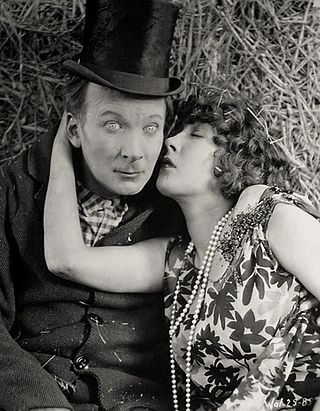
Hot for Paris is a 1929 American pre-Code black-and-white romantic adventure musical film. This film is believed to be lost. The film is also known as Fifì dimmi di sì in Italy and Un marido afortunado in Spain. The film length (metres) is 1710.84 m in the silent version and 2002.54 m in the sound version.

We'll Gather Lilacs, also called We'll Gather Lilacs In The Spring, is a song by Welsh composer Ivor Novello which he wrote for the hit musical romance Perchance to Dream. The stage musical opened at the Hippodrome Theatre in London's West End in 1945 and ran until 1948. The song, sung in the show by Olive Gilbert, was the most popular and enduring to emerge from the production.
It was originally recorded by Muriel Barron & Olive Gilbert (1945) and by Geraldo and his Orchestra, who reached the UK charts with it in 1946. A recording by Tommy Dorsey and His Orchestra was a minor hit in the US in 1946. It has since been performed by many artists, including notably Anne Ziegler and Webster Booth, Richard Tauber, Bing Crosby, Frank Sinatra, Marion Grimaldi and Julie Andrews.

Say One For Me is a 1959 American comedy musical film directed by Frank Tashlin and starring Bing Crosby, Debbie Reynolds and Robert Wagner. Stella Stevens made her film debut in Say One for Me and received the Golden Globe Award in 1960 for New Star of the Year-Actress for this film.

One for the Boys is a studio album recorded by American entertainer Connie Francis in 1959. It remained unreleased until 14 April 2023 when it was available for streaming on iTunes.
